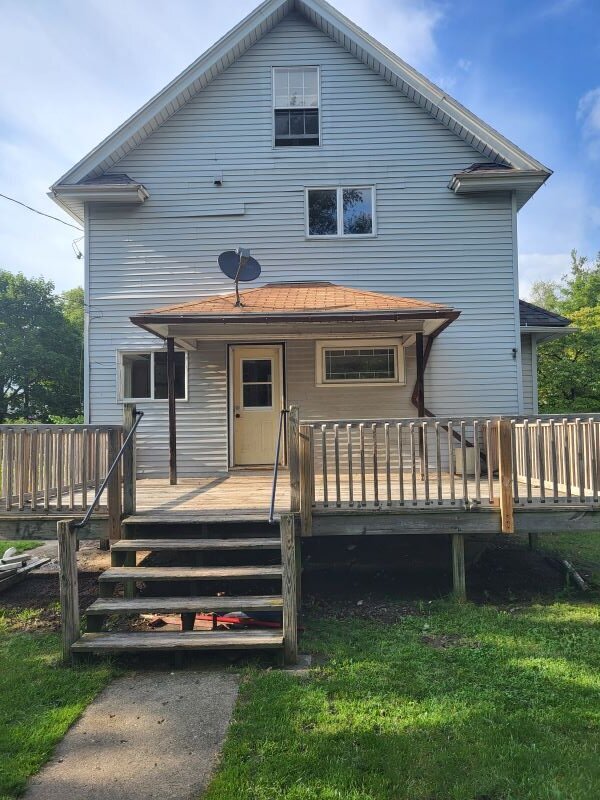
If you inherited a house in Michigan and you’re thinking about selling it, you probably have a lot of questions. From probate rules and taxes to paperwork and selling options, there’s a lot to figure out. Here’s what you need to know to sell an inherited house in Michigan during the probate process.
What Happens When You Inherit A House In Michigan
If you just inherited a house, you’re likely facing legal issues of ownership, what to do with the house, and whether to sell your inherited house. In Michigan, you usually can’t sell the home until the probate court gives you authority to act on behalf of the estate. That means you’ll need official documents before you can even list the property.
Sometimes probate isn’t needed. If the home was owned jointly with rights of survivorship or placed in a trust, you may be able to bypass the court process entirely. But most of the time, especially if the home was in the deceased’s name only, probate is required to transfer the title legally into your name. That’s the first legal step in selling inherited property.
What Happens When You Sell A House You Inherit
Selling an inherited home isn’t the same as selling one you’ve owned for years. You don’t owe capital gains tax on the full sale price. Instead, the IRS gives you a stepped-up basis. That means your tax basis is the fair market value of the home on the date of death. You’re only taxed on any profit above that amount.
For example, if the home was worth $210,000 when you inherited it and you sold it for $215,000, you’re only taxed on the $5,000 gain. That’s a big tax break. If you sell quickly after inheritance, there might be little to no tax owed. Michigan treats any gains as regular income and taxes them at the state rate of 4.25%. This is a key point when learning what happens when you sell a house you inherited.
Documents Required For Selling Inherited Property
Before you can sell your inherited property, you need to make sure all legal and real estate paperwork is in order. Missing documents can delay closing or cause title issues, especially in probate cases.
- Certified copy of the death certificate
- Letters of Authority from the probate court
- Property deed or recorded title
- Court order approving the sale (if selling during probate)
- Recent property tax records
- Final utility bills and insurance documents
- Property appraisal or market valuation at the time of death
These are the key documents required for selling inherited property in Michigan. Once you have everything ready, share copies with your attorney, house-buying company in Michigan, and title company. This ensures the closing process moves forward without complications or legal objections from the court or other heirs.
How Probate Affects The Sale
When you’re dealing with an inherited house in Michigan, probate is required unless the home was jointly owned or in a trust. You can’t legally sell the property until the court gives permission or the process is complete.
When Probate Is Required
Probate is usually triggered when the deceased owned the property alone. The court appoints a personal representative and grants them the legal right to manage and sell estate property.
Timeline Of Probate In Michigan
Probate typically lasts 6 to 12 months. It may be quicker for small estates or longer if heirs disagree or creditors file claims. During this time, selling estate property must be done under court supervision.
Selling During Probate
You can request court permission to sell the home before probate is complete. This usually requires showing that the sale benefits the estate, such as covering debts or reducing holding costs.
Risks Of Ignoring Probate
Selling without court authority can create legal issues. Title companies won’t allow closing if ownership isn’t clearly transferred, which can delay or cancel a sale entirely.
Do You Have To Pay Taxes When You Sell An Inherited House?
You won’t owe inheritance tax in Michigan because the state doesn’t have one. But you may owe capital gains tax, depending on how much the home has appreciated since the person passed away. You’ll get a stepped-up basis, which means the IRS resets the home’s value to what it was worth when you inherited it, not what the original owner paid.
If you sell the house for more than that new value, you may be taxed on the difference. But if you sell it quickly and the price hasn’t changed much, there’s usually little to no gain. Michigan will treat any gain as income and tax it at 4.25%. You should always get a professional valuation dated as close to the death as possible. Tax questions often come up in situations involving real estate inheritance.
Should You Sell The House Or Keep It?
After you inherit a home, one of the first decisions you’ll make is what to do with it. Selling might seem obvious, but it’s not the only option. You could also rent it out or move in.
- Selling gives you a clean break and fast cash.
- Renting may generate passive income, but it comes with upkeep.
- Living in the home can offer stability or emotional closure.
- Keeping the house means ongoing property taxes and insurance.
- Multiple heirs may disagree, which can stall any decision.
Selling makes sense if the home needs repairs, has no emotional attachment, or if you and other heirs can’t agree on how to manage it. Evaluate your finances, time, and long-term goals before you decide. If your goal is to sell inherited home assets quickly and cleanly, this may be your best route.
What Is The Fastest Way To Sell An Inherited House?
If you want to sell the home quickly, the best solution is a cash home sale. Many inherited properties sit vacant, need repairs, or have multiple heirs involved. In these cases, selling your house as-is for cash to a company that buys houses in Kalamazoo helps you avoid stress, delays, and holding costs.
- Sell directly to a local cash home buyer.
- Skip repairs, showings, and inspections.
- Avoid agent fees or commissions.
- Close in a few weeks, not months.
- Receive a firm offer with no financing contingencies.
- Use a title company familiar with probate sales.
Cash buyers purchase homes as-is, even during the probate process. If your priority is speed and simplicity, this is the most direct path to closing without court delays or out-of-pocket expenses. It’s a smart way to sell an inherited house fast when time is limited.
Can You Sell An Inherited House Before Probate Is Complete?
It depends. You generally need to wait until probate is finished to sell the house. But in some cases, the court may allow you to sell earlier if it benefits the estate.
Court Permission To Sell
If the estate has debts or the home is deteriorating, the court may approve an early sale. You’ll need a formal petition and supporting documents to get approval.
Role Of The Personal Representative
The personal representative has the authority to request the sale, but they can’t finalize it without the court’s signature if probate is still ongoing.
What Can Delay An Early Sale
If heirs object or if the estate has unresolved legal claims, the court may hold off on approving any transaction until those issues are settled. This can apply to inherited houses, condos, or even selling inherited land under the same probate process.
Sell My Inherited House Fast In Kalamazoo, MI
If you’ve inherited a house and want to sell it in Kalamazoo, we can help you skip the repairs, showings and delays. Ryan Buys Houses pays cash for inherited homes in any condition, and we make the process simple and fast. Fill out our online form or call Ryan Buys Houses at (269) 775-4095 to get a cash offer.
